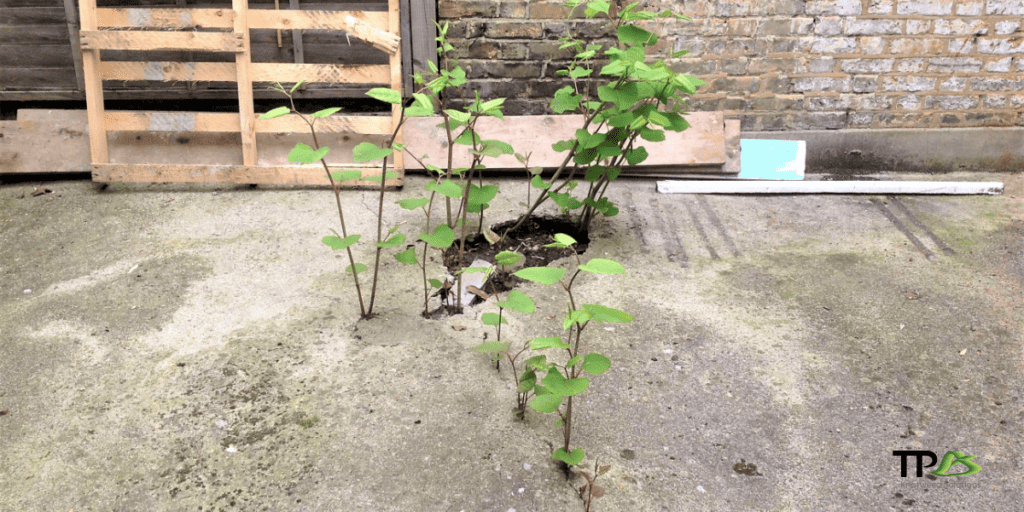Japanese Knotweed is gaining a notorious reputation for being one of the most destructive and invasive plants to ever have existed in the UK. If you choose to neglect this infamous weed, it may cause serious harm to your property or the land of your neighbours, necessitating costly treatments and financial compensation. Legal action may be taken if reasonable efforts to manage the weed are not taken seriously.
You may have noticed the recent rise in Japanese Knotweed claims making it into the news. According to some estimates, various Councils and Network Rail may be required to pay up to £10 million to remedy Japanese Knotweed damages. Let’s dive deeper into the serious damage Japanese Knotweed can cause, and why you simply can’t afford to ignore it.
Damage Caused by Japanese Knotweed

Japanese Knotweed can cause a range of damage to both natural and built environments. Here are some of the most significant ways in which Japanese Knotweed can cause damage:
Structural Damage
Japanese Knotweed has a strong and extensive root system that can penetrate through hard surfaces like concrete, asphalt, and brick. As the plant grows, it can cause significant damage to building foundations, walls, and drainage systems, which can be very costly to repair.
Ecological Damage
Japanese Knotweed can outcompete and displace native plant species, which can lead to a loss of biodiversity and impact the ecological balance of natural habitats. It also changes soil chemistry, making it difficult for other plant species to thrive.
Flood Risk
The plant’s dense growth can impede water flow, increasing the risk of flooding in nearby areas.
Property Value Loss
The presence of Japanese Knotweed on a property can significantly reduce its value, making it difficult to sell or obtain a mortgage.
Legal Consequences
Japanese Knotweed is a controlled plant as defined by the Wildlife and Countryside Act of 1981. This indicates that allowing this species to flourish in the wild is prohibited. Anyone who does not take action to stop its spread may be subject to a fine of up to £5,000 or a prison sentence of up to two years. Additional legal rules, such as the Anti-Social Behaviour Crime and Policing Act 2014, the Environmental Protection Act 1990, and the Infrastructure Act 2015, relate to the management of Japanese Knotweed. If the plant is let to grow from a property owner’s land onto adjoining properties, into wild habitats, or into open spaces, all of these situations may give rise to legal action for the negligent cultivation of Japanese Knotweed.
Overall, the damage caused by Japanese Knotweed can have serious implications for the environment, property owners, and the wider community. It is important to take action to control its spread and minimise its impact.
Japanese Knotweed Claims

Wondering how to make a Japanese Knotweed Claim?
If Japanese Knotweed has spread from a neighbouring property onto yours, you may be able to make a nuisance claim and obtain an injunction (Court Order) requiring your neighbour to remove the Knotweed, or they can simply offer you Japanese Knotweed compensation.
For the impacts of Japanese Knotweed, you may also be entitled to approach Japanese Knotweed solicitors to recover damages, medical expenses, and legal fees.
If you want to sell your house, Japanese Knotweed can pose major problems. If you have Japanese Knotweed on your property, many lenders may refuse to grant you a mortgage. You might be entitled to sue for damages if a sale is cancelled because of the presence of Japanese Knotweed.
Japanese knotweed should be noted and declared by the sellers; this is especially important in the winter when it is not readily apparent. You could sue the seller if there is Knotweed on the property. Prior to your acquisition, the property surveyor should have made a note of the existence of Japanese Knotweed if you had a survey done on the property.
Similar to this, you might be able to make a claim for the value loss if Japanese Knotweed causes your property’s worth to decrease. This is referred to as a value decline.
Notable Claims Cases
- – Bristol City Council filed a complaint under the Anti-Social Behaviour, Crime and Policing Act 2014 (the “Act”) against a local property owner after receiving complaints about the spread of Japanese Knotweed from other houses. The site’s owner, MB Estates Limited, was found guilty and ordered to pay a fine of £18,000 plus costs and treat the entire area for Knotweed within 28 days.
- – In another instance, The Court of Appeal determined in Williams v. Network Rail Infrastructure Ltd. that landowners who have Japanese Knotweed encroaching on their property do not have to wait until actual property damage takes place before filing a private nuisance claim that is actionable.
Defending against Japanese Knotweed Claims
The majority of land and home owners are unaware of the legal responsibilities and consequences of Japanese Knotweed. Only 36% of respondents to a recent survey recognised they could be sued, and only 18% knew they could be prosecuted.
However, if Japanese Knotweed is not properly managed or eliminated, it can harm nearby properties and possibly result in the condemnation of structures, thus it must be dealt with carefully.
If you want to sell your house, Japanese Knotweed can pose major problems. If you have Japanese Knotweed on your property, many lenders won’t provide you a loan. If Japanese Knotweed is found on your property, you are obligated to disclose it; failing to do so will result in a claim against you because it is a blatant deception to the buyer.
Additionally, if your neighbour loses a sale as a result of the Japanese Knotweed invasion or sees a decline in the value of their property, they may file a claim against you. This can result in a tens of thousands of pound claim being made against you. Therefore, it is essential to seek legal counsel as soon as possible if you have Japanese Knotweed.
Speak to a Professional
If you think you have identified Japanese Knotweed, it is important to contact a certified expert if you find Japanese Knotweed on your property, or your local council if in any public area.
To avoid further damage and repercussions, book a thorough Japanese Knotweed Survey from knowledgeable professionals in order to determine the most effective treatment and removal for your case of Japanese Knotweed.




